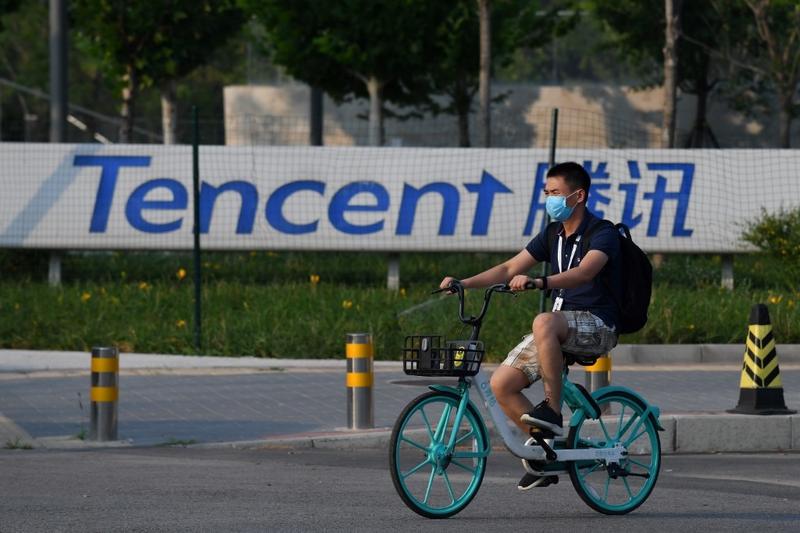 In this Aug 7, 2020 file photo, a man walks past a sign for Tencent, the parent company of Chinese social media giant WeChat, outside the Tencent headquarters in Beijing. (GREG BAKER / AFP)
In this Aug 7, 2020 file photo, a man walks past a sign for Tencent, the parent company of Chinese social media giant WeChat, outside the Tencent headquarters in Beijing. (GREG BAKER / AFP)
Tencent Holdings Ltd has identified three areas to turbo-charge enterprises with its digital technologies.
Spanning research, manufacturing, supply, sales and services, Tencent Cloud plans to team up with 100 partners and co-create 1,000 industrial solutions in the future, according to Tencent's global digital ecosystem conference held last month
It marks the internet-based company's latest move to extend its technology prowess in consumer products to business-level offerings.
The emphasis on industrial internet platforms, digitalization of enterprises and industrial artificial intelligence, represents the central plank of Tencent Cloud, the company's cloud computing unit.
Spanning research, manufacturing, supply, sales and services, Tencent Cloud plans to team up with 100 partners and co-create 1,000 industrial solutions in the future, according to Tencent's global digital ecosystem conference held last month.
"The COVID-19 pandemic has to some extent accelerated the digital transformation of traditional enterprises," said Cai Yi, head of Tencent Cloud in charge of enterprise businesses.
"With favorable policies, demand for industrial cloudbased products and industrial internet platforms keeps surging."
Tencent Cloud offers an end-to-end enterprise solution called "WeMake", covering the full spectrum of the industrial process.
It will seek to customize solutions based on the varying needs and application scenarios of different industries and clients.
Apart from digital transformation solutions, the company also vowed to construct industrial internet platforms, with a focus on regional development of industry. It also pledged to unveil innovative plans based on industrial scenarios combining big data and AI.
Tencent Cloud already has a track record of offering industrial solutions. For instance, it is working with leading manufacturers like Foxconn Industrial Internet Co in smart manufacturing, where the pair began implementing an innovative end-to-end cloud-based solution since 2018 that is helping Foxconn build, deploy and operate its industrial internet.
The architecture connects brilliant machines, big data, and people at work to enable person-to-person, person-to-machine, and machine-to-machine communication, according to Liu Zongchang, chief data officer at Foxconn.
"Foxconn Industrial Internet provides a one-stop development environment and Tencent Cloud, as the application operation platform, helps get applications online and supports functions such as intelligent publishing and service access, integrating app development and operations," he said. "This can help evolve the industrial platform as a service capability and accelerate Foxconn's technological capabilities used for other companies."
ALSO READ: Tencent releases new simulation platform for autonomous driving
The pandemic has slowed digitalization. A McKinsey survey this year on manufacturing and supply-chain professionals found that 93 percent of respondents plan to focus on resilience of their supply chain, and 90 percent plan to invest in talent for digitalization.
Technology companies are jumping on the smart manufacturing bandwagon as China aims to up the ante in high-end production.
Alibaba Group Holding Ltd last month unveiled a smart manufacturing and digital solutions factory in Hangzhou, Zhejiang province, as part of its smart manufacturing initiatives.
READ MORE: Alibaba's newest business: modernizing China's factories
The Xunxi Digital Factory offers small and medium-sized enterprises a digitalized end-to-end manufacturing supply chain that enables fully-customized and demand-driven production.
Powered by new technologies such as real-time resourcing, process and cost planning, automated in-house logistics, and Xunxi's own manufacturing operating system, the factory is able to produce small-batch orders at reasonable cost and with shorter delivery times.


